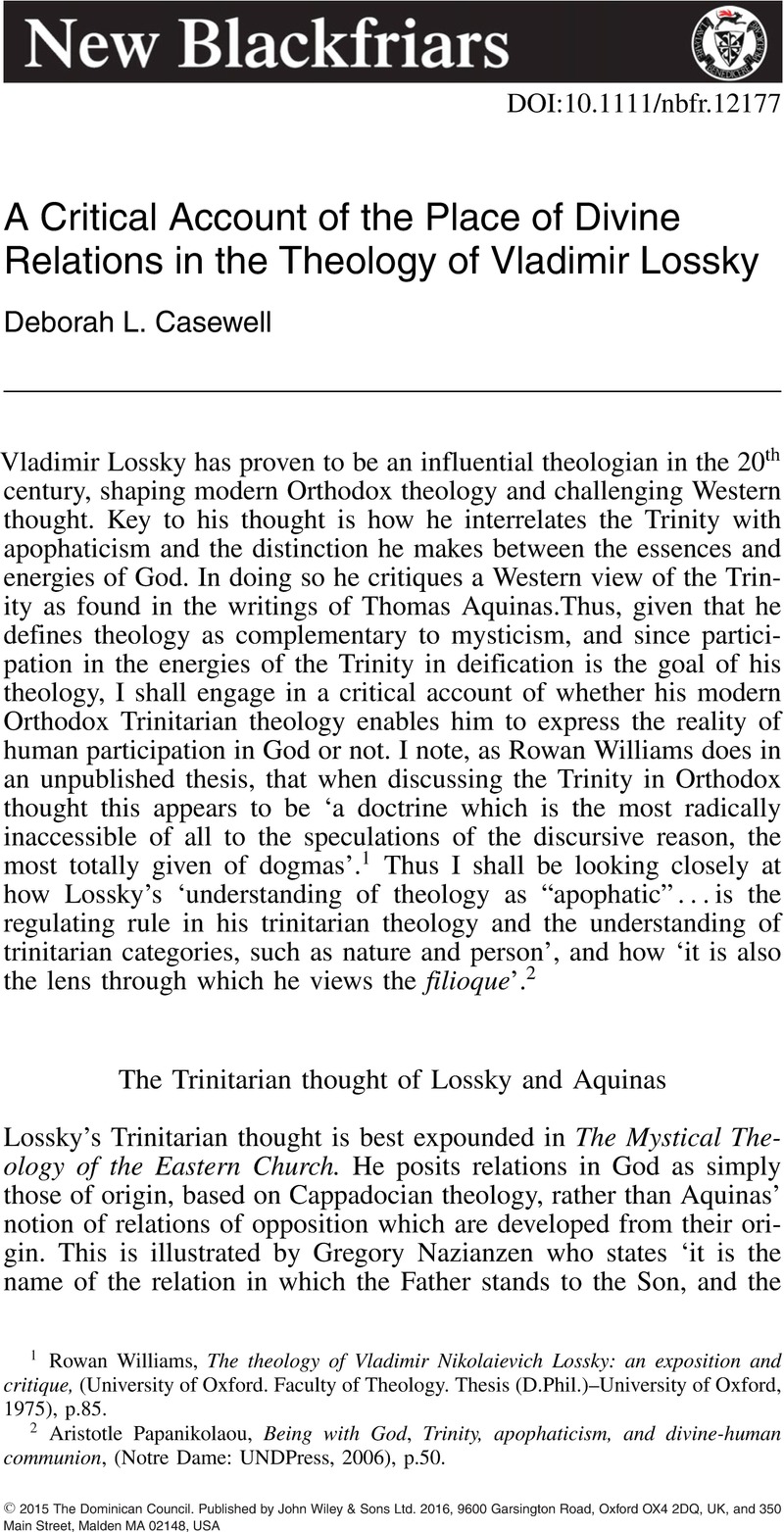No CrossRef data available.
Published online by Cambridge University Press: 01 January 2024

1 Williams, Rowan, The theology of Vladimir Nikolaievich Lossky: an exposition and critique, (University of Oxford. Faculty of Theology. Thesis (D.Phil.)–University of Oxford, 1975), p.85Google Scholar.
2 Papanikolaou, Aristotle, Being with God, Trinity, apophaticism, and divine-human communion, (Notre Dame: UNDPress, 2006), p.50CrossRefGoogle Scholar.
3 [29:16] The Theological Orations, in Christology of the Later Fathers, ed. Hardy, , (London: SCM Press, 1954), p.171Google Scholar.
4 Summa Theologiae, St.Aquinas, Thomas, ed. Gilby, (London: Blackfriars, 1964-68Google Scholar), ST 1a 27:4.
5 ST 1a 28:3.
6 ST 1a 29:4.
7 LaCugna, Catherine, God For Us, (USA: HarperSanFrancisco, 1991), p.145Google Scholar.
8 LaCugna, p.154.
9 LaCugna, p.157.
10 [28:17], The Theological Orations, p.147.
11 [29:8], The Theological Orations, p.165.
12 Lossky, Vladimir, The Mystical Theology of the Eastern Church, (NY: St. Vladimirs Seminary Press, 1976), pp.54-5Google Scholar.
13 Williams, Rowan, ‘What does love know? St Thomas on the Trinity’, New Blackfriars, 2001, Vol.82 (964), pp.260-272, p.267CrossRefGoogle Scholar.
14 Williams, p.268.
15 Vladimir Lossky, Mystical Theology, p.57.
16 Lossky, , In the Image and Likeness of God, (NY: St. Vladimir's Seminary Press, 1985), p.103Google Scholar.
17 Lossky, Mystical Theology, p.57.
18 Lossky, p.55.
19 Lossky, p.57.
20 Williams, The theology of Vladimir Nikolaievich Lossky, p.150.
21 Lossky, p.58.
22 Williams, ‘What does love know?’, p.265.
23 ST 1a 27:4.
24 Williams, The theology of Vladimir Nikolaievich Lossky, p.135.
25 Williams, p.136.
26 Williams, p.152.
27 Williams, p.154.
28 Williams, p.155.
29 Williams, p.132.
30 Williams, p.132.
31 Lossky, Image and Likeness, p.88.
32 Williams, p.159.
33 Lossky, , The Vision of God, (NY: St Vladimir's Seminary Press, 1997), p.78Google Scholar.
34 Lossky, p.157.
35 Papanikolaou, Aristotle, “Divine energies or divine personhood: Vladimir Lossky and John Zizoulas on conceiving the transcendent and immanent God.” Modern Theology 19, no. 3 (2003): 357-385CrossRefGoogle Scholar. p.357.
36 Lossky, Mystical Theology, p.71.
37 Lossky, p.72
38 Lossky, p.73.
39 Lossky, p.86.
40 Lossky, p.86.
41 Lossky, p.28.
42 Lossky, p.33.
43 Lossky, p.39.
44 Williams, p.2.
45 Chrestos, Giannaras, Elements of faith: an introduction to Orthodox theology. (Edinburgh: T.&T. Clark, 1991), p.17Google Scholar.
46 Papanikolaou, Being with God, p.29.
47 Papanikolaou, p.92.
48 Papanikolaou, p.70.
49 Lossky, Image and Likeness, p.96.
50 Papanikolaou, p.377.
51 Williams, The theology of Vladimir Nikolaievich Lossky, p.160.
52 Lossky, Mystical Theology, p.66.
53 Lossky, Image and Likeness, p.80.
54 Lossky, Mystical Theology, p.8.
55 Lossky, p.38.
56 Lossky, p.39.
57 Lossky, p.65.
58 Lossky, p.67.
59 Lossky, p.70.
60 Lossky, p.87.
61 Lossky, p.70.
62 Lossky, p.86.
63 Lossky, p.73.
64 Lossky, p.74.
65 Lossly, p.81.
66 Lossky, p.45.